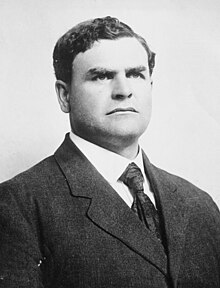 Warner in 1900 | |
| Biographical details | |
|---|---|
| Born | April 5, 1871 Springville, New York, U.S. |
| Died | September 7, 1954 (aged 83) Palo Alto, California, U.S. |
| Playing career | |
| Football | |
| 1892–1894 | Cornell |
| 1902 | Syracuse Athletic Club |
| Position(s) | Guard |
| Coaching career (HC unless noted) | |
| Football | |
| 1895–1896 | Georgia |
| 1895–1899 | Iowa Agricultural/State |
| 1897–1898 | Cornell |
| 1899–1903 | Carlisle |
| 1904–1906 | Cornell |
| 1907–1914 | Carlisle |
| 1915–1923 | Pittsburgh |
| 1924–1932 | Stanford |
| 1933–1938 | Temple |
| 1939–1940 | San Jose State (associate) |
| Baseball | |
| 1905–1906 | Cornell |
| Head coaching record | |
| Overall | 319–106–32 (football)[n 1] 36–15 (baseball) |
| Bowls | 1–1–2 |
| Accomplishments and honors | |
| Championships | |
| 4 national (1915, 1916, 1918, 1926) 1 SIAA (1896) 4 PCC (1924, 1926–1927, 1929) | |
| Awards | |
| Amos Alonzo Stagg Award (1948) | |
| College Football Hall of Fame Inducted in 1951 (profile) | |
Glenn Scobey Warner (April 5, 1871 – September 7, 1954), most commonly known as Pop Warner, was an American college football coach at various institutions who is responsible for several key aspects of the modern game. Included among his innovations are the single and double wing formations (precursors of the modern spread and shotgun formations[2]), the three point stance and the body blocking technique.[2] Fellow pioneer coach Amos Alonzo Stagg called Warner "one of the excellent creators".[3][4] He was inducted as a coach into the College Football Hall of Fame as part of its inaugural class in 1951.[2] He also contributed to a junior football program which became known as Pop Warner Little Scholars, a popular youth American football organization.[5]
In the early 1900s, he created a premier football program at the Carlisle Indian Industrial School—a federally-funded, off-reservation American Indian boarding school.[6] He also coached teams to four national championships: Pittsburgh in 1915, 1916, and 1918 and Stanford in 1926.[7] In all, he was head coach at the University of Georgia (1895–1896), Iowa Agricultural College and Model Farm (1895–1899), Cornell University (1897–1898 and 1904–1906), Carlisle (1899–1903 and 1907–1914), Pittsburgh (1915–1923), Stanford (1924–1932) and Temple University (1933–1938), compiling a career college football record of 319–106–32.[n 1] Predating Bear Bryant, Eddie Robinson, and Joe Paterno, he once had the most wins of any coach in college football history.[8]
- ^ Cite error: The named reference
records2was invoked but never defined (see the help page). - ^ a b c Jeremy Stoltz (June 21, 2007). "Chalk Talk: the Single-Wing". scout.com. Retrieved September 24, 2016.
- ^ Pope, p. 293
- ^ Reet A. Howell (1978). "The Myth of "Pop Warner": Carlisle Revisited". Quest. 30 (1): 19–27. doi:10.1080/00336297.1978.10702797.
- ^ "About Us". www.popwarner.com. Archived from the original on March 5, 2016. Retrieved February 23, 2016.
- ^ Jim Morrison (December 28, 2010). "The Early History of Football's Forward Pass". smithsonian.com. Retrieved October 2, 2016.
- ^ Cite error: The named reference
champwas invoked but never defined (see the help page). - ^ Bob Hersom (December 23, 2000). "Father Football The Bowden family is synonymous with success". newsok.com. Retrieved September 24, 2016.
Cite error: There are <ref group=n> tags on this page, but the references will not show without a {{reflist|group=n}} template (see the help page).
